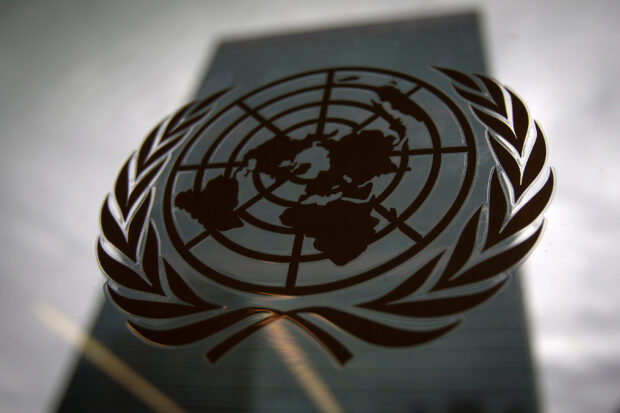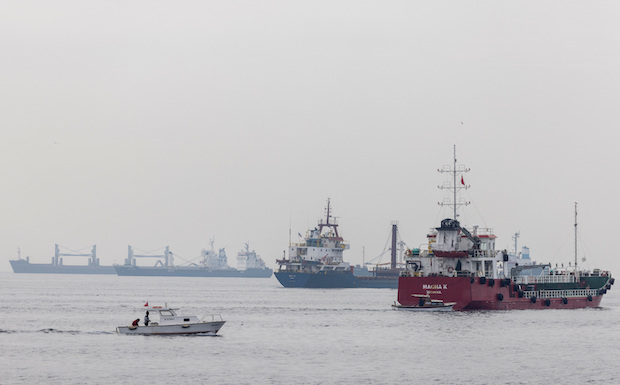Poor states use food crisis fight to get big power attention at UN

FILE PHOTO: The United Nations headquarters building is pictured though a window with the UN logo in the foreground in the Manhattan borough of New York, August 15, 2014. REUTERS/Carlo Allegri/File Photo
UNITED NATIONS — In his speech opening the annual United Nations gathering of world leaders this week, Secretary-General Antonio Gutteres vowed – to applause – that he would “not give up” trying to get food and fertilizer from Russia and Ukraine to global markets.
After Russia invaded Ukraine in February 2022 the United Nations blamed the war for worsening a global food crisis and a new diplomatic frontline emerged, with Moscow and Kyiv fighting to win over those hit hardest: poor and developing countries.
That battle has been at the forefront this week at the high-level U.N. General Assembly, where the applause for Guterres’ remarks on Tuesday underscored the push from those countries, particularly from the Global South, to get big powers to focus on their most important challenges.
“We are no longer willing to come to this annual parade merely to lend our voice to support of this or that global conflict or to condemn whoever from year to year as the new global enemy,” said Saint Lucia’s Prime Minister Philip Pierre.
“No powerful nation’s global agenda is more important than our own,” he told the General Assembly.
Article continues after this advertisementNo relief in sight
It is not clear, however, that meetings at the U.N. this week will yield any quick relief to countries struggling to feed their people – specifically the revival of a landmark deal that had allowed the safe Black Sea export of Ukrainian grain, which Russia quit two months ago.
Article continues after this advertisementGuterres this week met separately with Ukrainian President Volodymyr Zelensky and Russian Foreign Minister Sergei Lavrov and is also due to meet Turkish Foreign Minister Hakan Fidan, but with no apparent breakthrough in efforts to revive the deal brokered by the U.N. and Turkey in July 2022.
The absence of four of the five leaders of the permanent U.N. Security Council members – U.S. President Joe Biden was the only one attending – has further deepened the skepticism among developing nations.
“That is not how you build trust. That is not how you show solidarity. That is not accountability, and that is not leadership,” Malawi’s President Lazarus Chakwera told the General Assembly, referring to the absence of the other four leaders.
With geopolitical tensions looming over this week’s meetings – especially the rivalries between the United States, Russia and China – developing countries made the most of their position, said Richard Gowan, U.N. director for the International Crisis Group.
“Developing countries know the U.S., China and Russia all want their support at the U.N. They successfully leveraged their new influence to make sure the U.N. focused on their economic concerns this week,” said Gowan.
High on that list of concerns is addressing a global food crisis. Ukraine and Russia are both major grain exporters and Moscow is also a big supplier of fertilizer to the world.
“The world badly needs Ukrainian food and Russian food and fertilizers to stabilize markets and guarantee food security,” Guterres told the General Assembly.
Kenya’s President William Ruto, speaking at a World Economic Forum in New York, said that the war in Ukraine had “led to soaring prices of essential commodities such as food, fuel and fertilizer, amplifying the plight of vulnerable countries and communities.”

Commercial vessels including vessels that are part of the Black Sea grain deal wait to pass the Bosphorus strait off the shores of Yenikapi during a misty morning in Istanbul, Turkey, Oct. 31, 2022. (Photo by UMIT BEKTAS / Reuters)
Grain deal revival?
Moscow essentially agreed to the Black Sea grain deal in return for U.N. help to improve its own food and fertilizer exports, which it complained were facing obstacles because of Western sanctions.
Russia’s Deputy Prime Minister Alexei Overchuk said “developing, and primarily the least developed countries fell hostage” to those Western sanctions, which he blamed for making global economic problems worse.
“Notwithstanding the political and economic pressure that it is facing, Russia remains a reliable international supplier of food, fertilizers and energy resources,” Overchuk told a sustainable development summit at the United Nations this week.
While Russia’s grain and fertilizer exports are not subject to Western sanctions, Moscow has said restrictions on payments, logistics and insurance have impeded shipments.
The United States has pushed back against Russia’s complaints, pointing out that while Ukraine’s wheat exports will likely decline, Russia is on track for a record year of grain exports and large profits.
“The hungrier the world is, the more Moscow profits,” U.S. Secretary of State Antony Blinken told the U.N. Security Council.
Russia is forecast to have a bumper wheat crop this year of 91.6 million tons, its SovEcon agriculture consultancy has said, while the agriculture ministry said Russia would be able to export 60 million tonnes of grains in the 2023/2024 season.
Asked this week about prospects for reviving the Black Sea grain deal, the European Union’s foreign policy chief, Josep Borrell, was downbeat.
“It seems that there is not any possibility of reaching an agreement because I strongly believe that they (Russia) don’t want this,” Borrell told reporters.